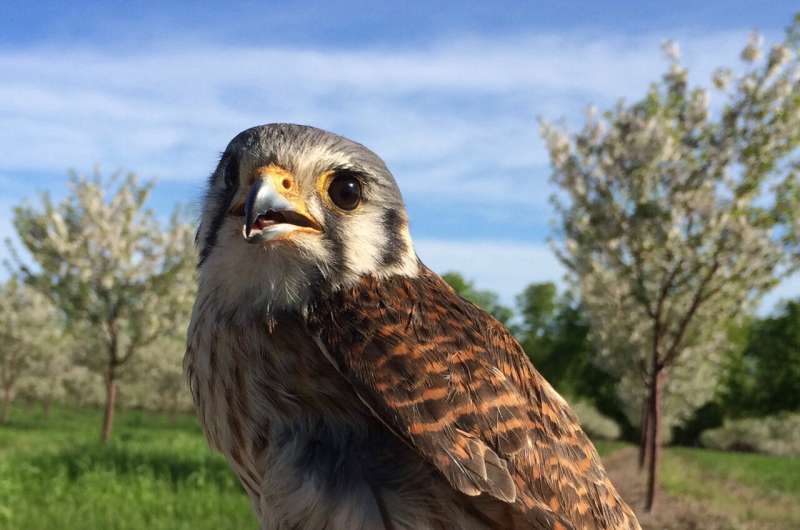Science
Michigan Farmers Harness Falcons to Enhance Cherry Crop Safety

Farmers in northern Michigan are turning to an unexpected ally in their efforts to protect cherry crops: the American kestrel, the smallest falcon in the United States. This innovative approach, highlighted in a study from Michigan State University published on November 27, 2025, in the Journal of Applied Ecology, shows that these small raptors not only deter fruit-eating birds but may also contribute to food safety by minimizing contamination risks.
The cherry harvest has concluded for the year, but growers are already preparing for the next season, anticipating the return of kestrels to their orchards. These birds of prey are known for their hunting skills, which include hovering in midair as they search for insects and small birds. According to lead author Olivia Smith, the presence of kestrels can significantly reduce the number of smaller birds that feed on cherries, thereby preventing potential contamination from bird droppings.
Impact of Kestrels on Crop Management
The research indicates that kestrels can play a vital role in enhancing the safety and profitability of cherry farming. Traditionally, growers have employed various methods, such as nets, scarecrows, and chemical repellents, to keep birds away from their crops. However, these techniques often prove costly and ineffective. Each year, sweet cherry farmers in regions like Michigan, Washington, California, and Oregon lose between 5% and 30% of their crop to birds.
Kestrels offer a more sustainable solution. The study involved the installation of nest boxes in eight cherry orchards, which attracted kestrels that quickly adapted to their new environment. Observations during the harvest period revealed a notable decrease in the presence of fruit-eating birds such as robins, grackles, and starlings. The research team found that the presence of kestrels reduced fruit damage by more than tenfold.
Food Safety Benefits and Considerations
In addition to protecting crops, kestrels also contribute to food safety by reducing the likelihood of birds contaminating cherry trees with droppings. The study found a three-fold decrease in visible droppings on branches where kestrels nested. While kestrels themselves are not without their own waste, senior author Catherine Lindell noted that the benefits of keeping other fruit-eating birds away far outweigh the drawbacks.
DNA analysis conducted as part of the research revealed that 10% of droppings from other birds contained Campylobacter, a bacterium commonly associated with foodborne illnesses. Symptoms of such infections include diarrhea, fever, and stomach cramps. Despite this finding, the researchers emphasized that there have been no links between cherries and outbreaks of Campylobacter, with only one outbreak traced to birds in Alaska in 2008.
The findings suggest that kestrels could serve as a natural method for enhancing food safety in other crops, particularly those more frequently associated with foodborne illness outbreaks, such as leafy greens. “They are effective at reducing the amount of waste that can lead to transmission,” Smith explained, noting that this could be a significant advantage for farmers.
While the use of kestrels does not completely eliminate bird-related challenges, it represents a low-cost, low-maintenance strategy that farmers can incorporate into their bird management practices. As Catherine Lindell concluded, this approach offers an innovative solution that is both environmentally friendly and economically sound for growers looking to protect their crops in a sustainable manner.
The ongoing research at Michigan State University continues to explore the relationship between kestrels and crop safety, aiming to refine techniques that can further benefit agricultural practices. For now, cherry farmers in Michigan are optimistic about the potential of these raptors to enhance both the quality and safety of their harvests in the seasons to come.
-

 Technology5 months ago
Technology5 months agoDiscover the Top 10 Calorie Counting Apps of 2025
-

 Technology2 weeks ago
Technology2 weeks agoOpenAI to Implement Age Verification for ChatGPT by December 2025
-

 Health3 months ago
Health3 months agoBella Hadid Shares Health Update After Treatment for Lyme Disease
-

 Health3 months ago
Health3 months agoAnalysts Project Stronger Growth for Apple’s iPhone 17 Lineup
-

 Health3 months ago
Health3 months agoErin Bates Shares Recovery Update Following Sepsis Complications
-

 Technology5 months ago
Technology5 months agoDiscover How to Reverse Image Search Using ChatGPT Effortlessly
-

 Technology3 months ago
Technology3 months agoElectric Moto Influencer Surronster Arrested in Tijuana
-

 Technology2 months ago
Technology2 months agoDiscover 2025’s Top GPUs for Exceptional 4K Gaming Performance
-

 Technology5 months ago
Technology5 months agoMeta Initiates $60B AI Data Center Expansion, Starting in Ohio
-

 Technology5 months ago
Technology5 months agoRecovering a Suspended TikTok Account: A Step-by-Step Guide
-

 Health5 months ago
Health5 months agoTested: Rab Firewall Mountain Jacket Survives Harsh Conditions
-

 Lifestyle5 months ago
Lifestyle5 months agoBelton Family Reunites After Daughter Survives Hill Country Floods





















